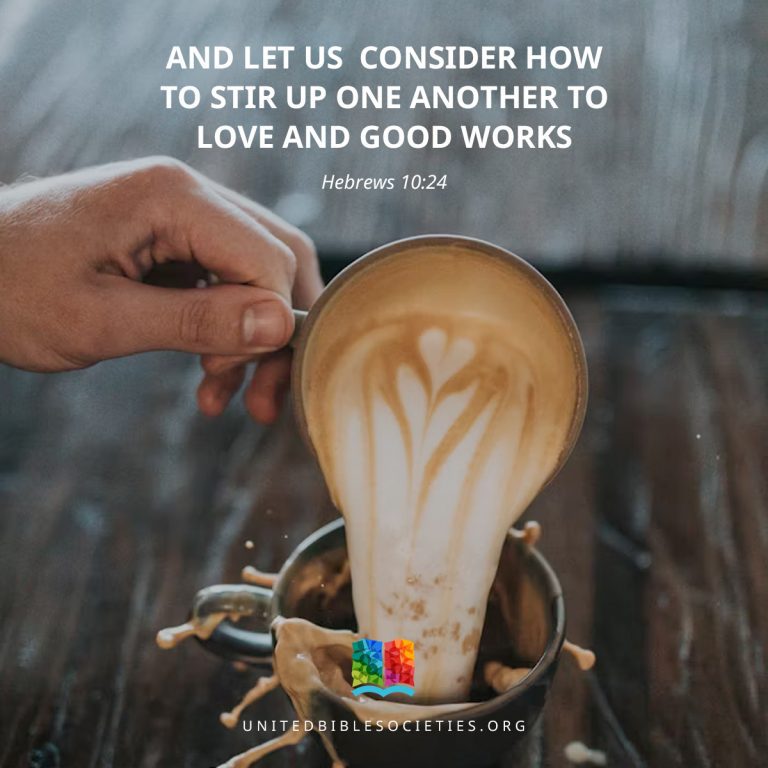aza 10
ṯireca ṯeḏi ŋeḏre ŋeḏi lizi leḏi izrayiil
1 ṯaŋwu, lieŋgeri linyi, nyi kwunaŋna ŋazi eḏizelŋe ŋu; papaŋa leri likwuɽbeḏizi tatap lebleṯ lu ner ṯamḏu tatap ṯujuli. 2 ner baptazini tatap eḏi muuza-na ki lebleṯ-na na ki ṯujul-na tɔk. 3 ner ye tatap eḏneya wutuput weḏi yilim, 4 ner ii tatap ŋaw ŋeḏi yilim, kaka iiḏir zi gwu ŋeḏi yilim ki liiɽi-na lir yilim leṯi zi kwaḏaḏa. linderṯa leni Kwruztu. 5 lakin, ner nani deŋgen-na litezir liti leṯəmi Allah-na mac, ner keṯini yaŋna yeŋen kwuḏer-na.




6 ṯaŋwu, kwɔmne ŋgwu tatap kwumer nyji gi ireci mindaŋ er ere orɔ nyiŋa zurum kweḏi ŋikya mac kaka ŋunduŋwuzi. 7 eṯere kwoce kwɔmne lu kwere mac, kwiti kwir Allah mac, kaka luru deŋgen-na; kaka luḏinar gwu, ŋaruŋw: lizi linanalu eḏeḏne mindaŋ eḏi ii, ner diɽi eḏi titi tɔk. 8 na nyiŋa pa, er ere ṯiŋaci ŋijina rɔgwɽɔ lu reri mac, kaka lizi litezir lerrizi deŋgen-na ner ay ki lamin lutuput lir kaka alaaf ṯuɽi-ṯɔɽɔl. 9 er ere ṯecici Kwelenyi mac, kaka ṯecicer gwu luru deŋgen-na mindaŋ, nezi yumow kiraza lu. 10 er ere ermiḏeḏa-na tɔk mac, kaka ermiḏeḏi gwu lizi-na kla deŋgen-na mindaŋ, nezi Kweleny kweḏi ŋiɽany eɽenye. 11 nezi kwɔmne ŋgwu tatap ilica eḏorɔ ṯireca, lakin ner zi lɔ eḏi ŋi ireci nyuŋwuzi linani ki lomur ṯa klu, linḏi li ṯiruwenelu ṯeḏi kwɔmne tatap eḏila. 12 ṯaŋwu, eḏi ŋgwa kweṯaruŋw, nyi kweṯenji ŋwara lu teter, eḏuŋw aŋrani mindaŋ muŋwere iidi mac. 13 ṯumɔmma ṯende ṯere ṯeṯi ŋazi mummi tir ter illi ṯeḏi lizigwunaŋ tatap. lakin, Allah weni wirlalu, witi wɔ ŋazi efrinji eḏi mummini ṯumɔmma ṯi ṯiṯi ṯeŋgeḏici ŋaŋa ŋuma mac, lakin eṯuŋw daɽmaci ŋaŋwuzi ṯaylu eḏi ṯi arṯiḏa ṯumɔmma, mindaŋ ma eḏi ŋuma eḏi ŋi firlaḏa la teter.
eḏi ruci ṯikwocalu-na tuk ṯeḏi kwɔmne kwiti kwir Allah wumiiḏu mac
14 ṯaŋwu, limɽi linyi, afrar a arṯiḏa ṯikwocalu ṯeḏi libayil. 15 nyi kwandicaŋazi kaka lizi leḏi yeyna; ṯecer ŋi rɔgwɽɔ ralu ŋa ŋandicanyji. 16 mer ortaḏa tiṯra teḏi ṯortaḏa, titi tiri ŋumaṯ ŋeḏi ŋin ŋeḏi Kwruztu manya? eḏne wa weṯir undena, witi wiri ŋumaṯ ŋeḏi aŋna weḏi Kwruztu manya? 17 kaka nani gwu eḏne wir duŋw lutuput, taŋwu, nyiŋa ta, enir gwu luru ner ṯa orɔ tatap aŋna wutuput, kaka oɽmaṯir gwu tatap duŋw keḏneya-na wir duŋw lutuput. 18 izarṯi əḏya weḏi lizi leḏi izrayiil; kla leṯi ye yiiḏi yeḏi karama liti linani ki ŋumaṯ-na ŋeḏi karama manya? 19 nyi kwari ḏa? kwɔmne ŋgwa kweṯir irlici libayila lu kwiri ŋiɽaŋal ŋere a? na kla leṯir zi eca, libayil, liri ŋiɽaŋal ŋere a? 20 beri. lakin, nyi kwaru ŋwu: kwɔmne ŋgwa kweṯir irlelu, kla liti leṯi kwoce Allah lu mac, kwirlicer rigɽima lu riki, ner ere irlici Allah lu mac. nyi kwiti kwunaŋnaŋazi eḏorɔ ŋumaṯi rigɽim ri riki mac. 21 ŋiti ŋofḏana ḏuṯ eḏi ii tiṯraŋi teḏi Kweleny, mindaŋ eḏi ri ii teḏi rigɽim riki. ŋende ŋofḏana eḏoɽmaṯi ki ṯarbeza ṯeḏi Kweleny mindaŋ eḏoɽmaṯi kwokwony ki bulu-na kweḏi rigɽim riki. 22 mer zi erri ŋu ta, a kwinḏir eḏukwazi Allah eḏi ke ŋiɽany a? a kwufirlir eḏi duŋgwun la?
23 a lara ŋwa: kwɔmne tatap kweni kwofḏana deŋgeri. aw, lakin nuŋw ere eḏi tatap ṯimeca-na mac. kwɔmne tatap kweni kwofḏana deŋgeri, lakin nuŋw ere tatap eḏi ŋuma eḏi duŋgwuŋgwazi lizi mac. 24 eḏuŋw ere kwere utezi rɔgwɽɔ ruŋwun kwɔmne nana mac, lakin eḏuŋw keni neŋnizi lizi liḏaḏu. 25 iiḏir yiiḏi yete nyiḏak yeṯir zi liṯa ki zuk-na, liti leḏi ṯuṯizelu ṯere mac ṯeḏi rugwor. 26 kaka ur gwu ṯurmun ṯeḏi Kweleny na kwɔmne tatap kwunani gwu-na. 27 ma ŋazi kwizi kwere kwiira ṯəmna ornaci eḏneya, na ma emni eḏele ta, iiḏiri keni kwete nyiḏak kwinḏuŋw eḏinḏeḏa ŋaŋwuzi, liti leḏi ṯuṯizelu ṯere mac ṯeḏi rugwor. 28 (lakin ma ŋa kwizi kwere eca ŋwu: eḏne wu wirlerlu, ṯaŋwu a ŋazi ŋimɽi yaḏa kwizi ŋgwa kwandicaŋazi, na ŋiɽaŋal ŋi ŋeḏi ṯugwor tɔk, 29 ŋandizanyji ŋeni ŋeḏi ṯugwor ṯuŋwun, ner ere orɔ ralu mac—eṯi zi iiḏi mac.) nyi kwilŋiiḏi eḏaruŋw, nyi kwiri hurr eḏi Kwruztu-na, lakin ŋende ŋizawi eḏefrinji hurriya winyi wu eḏorɔ ŋikya ki yey-na yeḏi ŋgwa kwiti kwiri hurr kinna mac. 30 menyeḏne kwamina, na ŋeni aḏa mindaŋ ner nyi ma ermiḏeḏa nana, ŋiɽaŋal ŋi ŋeḏi kwɔmne ŋgwa kweṯi nyi gi eca Allah zukran?
31 ŋwu ṯa, mezi ii, ya ma eḏne, ya mezerri ŋete nyiḏak, eṯizerri ŋu tatap eḏi ŋi nii Allah-na. 32 eṯi zi ere kiici lere ŋiɽaŋali-na mac, mer orɔ yahuuḏ ya yunaan, ya kla lir leḏi kaniiza keḏi Allah. 33 kaka eṯinyi gwu ṯecici eḏəmi lizi-na tatap kwɔmne gi-na ndendeṯ kweṯinyerri, iti neŋnicinyi gwu rɔgwɽɔ rinyi ŋiɽaŋali mac, lakin ŋeṯinyji neŋnici keni luru, mindaŋ mer kilaw.
Warnings against Idols
1 I want you to remember, my friends, what happened to our ancestors who followed Moses. They were all under the protection of the cloud, and all passed safely through the Red Sea. 2 In the cloud and in the sea they were all baptized as followers of Moses. 3 All ate the same spiritual bread 4 and drank the same spiritual drink. They drank from the spiritual rock that went with them; and that rock was Christ himself. 5 But even then God was not pleased with most of them, and so their dead bodies were scattered over the desert.
6 Now, all of this is an example for us, to warn us not to desire evil things, as they did, 7 nor to worship idols, as some of them did. As the scripture says, “The people sat down to a feast which turned into an orgy of drinking and sex.” 8 We must not be guilty of sexual immorality, as some of them were—and in one day twenty-three thousand of them fell dead. 9 We must not put the Lord to the test, as some of them did—and they were killed by snakes. 10 We must not complain, as some of them did—and they were destroyed by the Angel of Death.
11 All these things happened to them as examples for others, and they were written down as a warning for us. For we live at a time when the end is about to come.
12 If you think you are standing firm you had better be careful that you do not fall. 13 Every test that you have experienced is the kind that normally comes to people. But God keeps his promise, and he will not allow you to be tested beyond your power to remain firm; at the time you are put to the test, he will give you the strength to endure it, and so provide you with a way out.
14 So then, my dear friends, keep away from the worship of idols. 15 I speak to you as sensible people; judge for yourselves what I say. 16 The cup we use in the Lord's Supper and for which we give thanks to God: when we drink from it, we are sharing in the blood of Christ. And the bread we break: when we eat it, we are sharing in the body of Christ. 17 Because there is the one loaf of bread, all of us, though many, are one body, for we all share the same loaf.
18 Consider the people of Israel; those who eat what is offered in sacrifice share in the altar's service to God. 19 Do I imply, then, that an idol or the food offered to it really amounts to anything? 20 No! What I am saying is that what is sacrificed on pagan altars is offered to demons, not to God. And I do not want you to be partners with demons. 21 You cannot drink from the Lord's cup and also from the cup of demons; you cannot eat at the Lord's table and also at the table of demons. 22 Or do we want to make the Lord jealous? Do we think that we are stronger than he?
23 “We are allowed to do anything,” so they say. That is true, but not everything is good. “We are allowed to do anything”—but not everything is helpful. 24 None of you should be looking out for your own interests, but for the interests of others.
25 You are free to eat anything sold in the meat market, without asking any questions because of your conscience. 26 For, as the scripture says, “The earth and everything in it belong to the Lord.”
27 If an unbeliever invites you to a meal and you decide to go, eat what is set before you, without asking any questions because of your conscience. 28 But if someone tells you, “This food was offered to idols,” then do not eat that food, for the sake of the one who told you and for conscience' sake— 29 that is, not your own conscience, but the other person's conscience.
“Well, then,” someone asks, “why should my freedom to act be limited by another person's conscience? 30 If I thank God for my food, why should anyone criticize me about food for which I give thanks?”
31 Well, whatever you do, whether you eat or drink, do it all for God's glory. 32 Live in such a way as to cause no trouble either to Jews or Gentiles or to the church of God. 33 Just do as I do; I try to please everyone in all that I do, not thinking of my own good, but of the good of all, so that they might be saved.

